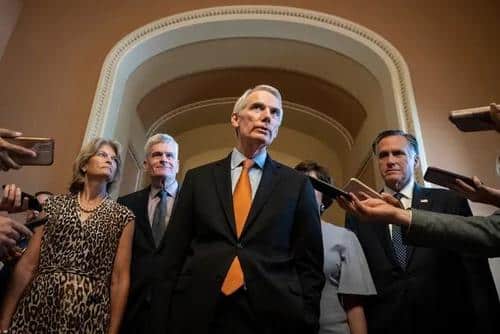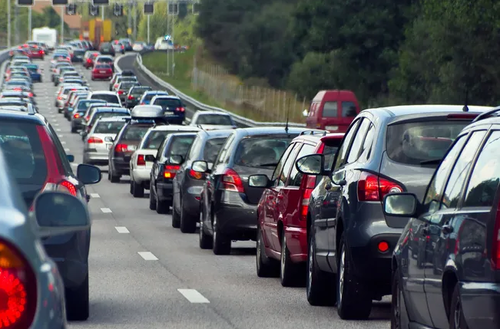After 50 hours of congressional debate over a 2,700 page, $1.2 trillion infrastructure bill, the US Senate is expected to pass the “once-in-a-generation” legislation, before it’s kicked back to the House of Representatives – where Speaker Nancy Pelosi (D-CA), has vowed to shelve it until the Senate also passes a separate $3.5 trillion partisan budget.
The infrastructure bill includes $550 billion in direct federal spending on a range pf projects, while reauthorizing spending on existing federal public-works programs. Breaking it down, the new spending includes just $110 billion for traditional ‘infrastructure,’ – meaning roads, bridges, and major projects. According to the White House, 20% of major highways and roads need repair, along with 45,000 bridges which are considered to be in poor condition. $55 billion of that will go towards water infrastructure.
$66 billion for trains – which will be used to upgrade passenger and freight rail, along with grants for intercity and high-speed train services.
$65 billion will go towards high-speed internet to millions living in rural and low-income communities. Companies which receive government funding as part of this allocation will be required to provide lower-priced plans, as well as allow customers to compare costs.
$73 billion for clean energy – which is far less than the Biden administration’s $100 billion goal. It will allocate billions towards new power transmission lines with higher-voltage capacities, as well as measures to electrify public transportation and $7.5 billion to build more electric car chargers (largely powered by coal). $21 billion will go towards ‘cleaning up soil and groundwater’ in older mines and gas fields.
Lawmakers are of course patting themselves on the back for their ability to come to an agreement, after nearly 70 senators from both parties voted to advance the measure over the weekend towards today’s final vote, scheduled for 11 a.m. And despite criticism from former President Trump, Republican bigwigs – including Senate Minority Leader Mitch McConnell (R-KY), are on board.
“It’s an issue where traditionally Republicans and Democrats have been able to come together and say, ‘We may disagree on taxes and healthcare and all sorts of other things, but on this issue of having strong infrastructure, we can come together,’” said Sen. Rob Portman (R-OH), the GOP’s lead negotiator on the deal.
“This bill will rebuild crumbling roads and bridges and tunnels across the country, it will provide clean drinking water in American homes and address harmful contaminants, it will increase connectivity in our communities to bring broadband to even the most rural parts of our country,” said Sen. Jeanne Shaheen, one of the architects of the plan.
Our nation’s public transit systems are inadequate — and it’s got to change. The Bipartisan Infrastructure Deal will make a historic investment in public transit to modernize and expand public transit in communities across the country.
— President Biden (@POTUS) August 10, 2021
Not everyone’s a fan…
As soon as the $1.2 trillion plan clears the Senate, Democrats are expected to immediately take up a $3.5 trillion partisan budget – which, as long as all Democrats (including moderates Manchin and Sinema) agree, can be passed via a fast-track budget reconciliation process that doesn’t require Republican support.
Critics, including Sen. Marsha Blackburn (R-TN) and Senate Candidate J.D. Vance have slammed the legislation as a “gateway to socialism” and a “disaster for our country.”
This bill is a gateway to socialism — not progress towards real infrastructure. pic.twitter.com/ozWoFIZ8jN
— Sen. Marsha Blackburn (@MarshaBlackburn) August 10, 2021
Looks like the infrastructure bill gave the Dems air cover to push a massive amnesty. This is a disaster for our country. pic.twitter.com/yF4A00dSCc
— J.D. Vance (@JDVance1) August 10, 2021
Meanwhile, the infrastructure bill will give a minimal boost to the US economy, according to leading economists cited by the Wall Street Journal.
The bipartisan infrastructure bill is unlikely to have a big impact on growth in the next few years, economists say. Longer term, though, investments in highways, ports and broadband could make the economy more efficient and productive.
The short-term boost to growth will be relatively limited for two reasons, economists say. For one, the bill represents just $550 billion in new spending—compared with nearly $6 trillion that Congress has approved in the past year-and-a-half to battle the Covid-19 pandemic and its economic fallout.
Second, the infrastructure spending will take place over five to 10 years starting in 2022, a longer timeline than pandemic-era initiatives like stimulus checks, extra unemployment benefits and small-business support programs. That will make its direct effects on employment and demand less noticeable.
Alec Phillips, chief political economist for Goldman Sachs Research, said the infrastructure bill could add around 0.2 percentage point to gross domestic product growth next year, and 0.3 percentage point in 2023.
What’s more, the infrastructure bill includes a pilot program for a national miles-driven tax, contradicting previous comments by President Biden that it wasn’t on the table, according to the Washington Times.
Tucked within the 2,702-page infrastructure bill is obscure language requiring the Department of Transportation to test the feasibility of taxing drivers for the number of miles they travel.
The tax would be broad enough to target any “passenger motor vehicles,” including light and medium-to-heavy duty trucks.”
The bill also requires Treasury Secretary Janet Yellen and Transportation Secretary Pete Buttigieg (or their successors) to report to Congress about the findings of the program within three years of its creation.
Sen. Chuck Grassley (R-IA), however, was quick to note on Tuesday morning that there is ‘no mileage tax or amnesty’ in the infrastructure bill.
There is NO mileage tax or amnesty in the bipartisan senate infrastructure bill. It doesn’t raise taxes We kept those things out My focus is investing in infrastructure for Iowa’s future: roads bridges locks&dams airports rural broadband etc This bill does that
— ChuckGrassley (@ChuckGrassley) August 10, 2021
Right Chuck, that comes next.




